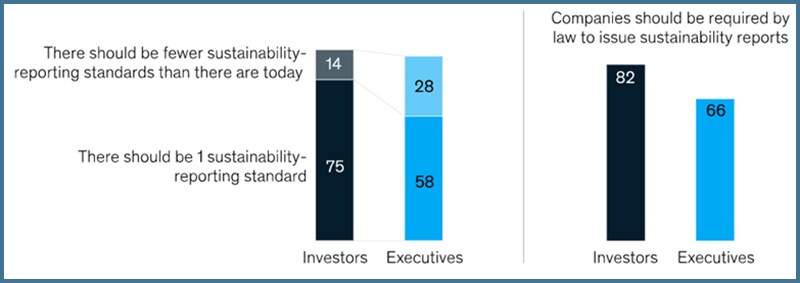Is ESG at the risk of becoming a smokescreen?
The world seems headed towards an inflexion point, where a lot of experts are undertaking well-meant ESG initiatives to reverse climate risk, while another set criticizes ESG as being lopsided and oft


ESG—Environmental, Social, and Governance factors to evaluate the companies and countries on how far they can contribute towards sustainability—has been a buzzword in the policy forums and corporate boardrooms in recent years. All thanks to the initiatives such as the United Nations" Sustainable Development Goals (SDGs), the Paris climate agreement, the Global Sustainable Initiative (GSI), and COP-26. The Global Sustainable Investment Alliance (GSIA) reports that sustainable investments across five markets, including the United States and the European Union, reached $35.3 trillion in assets under management, which is close to 36 percent of all professionally managed assets in these markets (Figure 1).
Figure 1: Global assets under management 2016-2018-2020 (USD billions)
Source: Global Sustainable Investment Review (GSIR) 2021
However, the world seems headed towards an inflexion point, where a lot of experts are undertaking well-meant ESG initiatives to reverse climate risk, while another set criticizes ESG as being lopsided and often a smokescreen. Is that really the case?
‘Greenwashing’ is threatening to derail the ESG focus. It is a deceitful marketing technique by which the companies hide the damage they cause to the environment and nature, and use advertising and public messaging to appear environmentally sustainable. For instance, recently, a lawsuit has been filed against one of the largest apparel brands in the world, alleging that the brand was using false sustainable marketing. Such high-profile investigations into greenwashing have prompted questions about the purpose and value of ESG. People are now criticizing ESG as “woke" politics. ESG is becoming a political fight due to the observers pointing to two potential factors. One is that ESG is becoming deeply ingrained in corporate America and financial markets focusing more on environmental issues, than on maximizing returns on government funds. Second, where Republicans are trying to score political points ahead of the elections. For instance, recently, the governor of Florida Ron DeSantis’s office declared ESG language as a threat to the vitality of the American economy, while US Republican lawmakers frame ESG investment efforts as a threat to employment and revenue.
The ESG framework was created to assist companies in managing environmental and social risks and to incentivise them to contribute to greater social and environmental impacts. Unfortunately, today there is a dizzying array of ESG objectives that fails to provide a comprehensible guide for investors and institutions. Further, due to cumbersome reporting systems and problematic applications of the framework, the very essence of ESG is at risk. Moreover, the world is moving towards an outsized focus on “E" i.e., environmental aspects. Perhaps, this is myopic and may have far-reaching ramifications in the future. This outsized focus on environmental aspects is about mitigation and transitioning businesses to a cleaner, environmentally sustainable way of operations. But environmental issues should equally be about adaptation. Adaptation is in the context of environmental changes, and how individuals, communities, and societies adjust to take advantage of these new opportunities. For instance, between 1990 to 2015, when humanity doubled its carbon emissions, the poorest 50 percent contributed just 7 percent of the emissions. However, the impact of climate change events is harshly felt across low-income countries. So, these countries have very little to contribute towards mitigation and transitioning. They have to focus on how to adapt to the evolving climate change impacts over which they have very little control. So also, the role of governance in pushing transparency and accountability cannot be emphasized enough. “G" in ESG is responsible for managing the risks that may be faced by those who are not a part of the investment decisions. Hence, ESG can fulfil its potential only if the world truly appreciates how E, S, and G are interconnected. The current reductionist approach is misleading & myopic.
Since the mid-2000s, ESG has become a core part of business planning and operations. However, measuring the impact of ESG Goals is complicated with the absence of internationally accepted standards. The Reserve Bank of India (RBI) finds most of the available data on climate finance insufficient for an appropriate assessment of climate-related financial risks. To make India’s financial system resilient to climate-related risks, RBI issued a discussion paper on climate risk and sustainable finance and sought suggestions for devising regulations.
The various rating agencies provide different ratings with diverging scores. According to the McKinsey Sustainability Reporting Survey, 75 percent of investors prefer a single sustainability reporting standard compared to multiple reporting standards (Figure 2).
Figure 2: Investors and Executives on the number of sustainability reporting standards
Source: McKinsey Sustainability Reporting Survey
So, clearly, in the absence of an internationally accepted reporting standard, how do you measure accountability?
In the absence of internationally accepted reporting standards, it is hard to measure the impact of climate risk on financial performance. Private ratings and score providers such as MSCI, Refinitiv, and S&P Global are competing to provide an insightful measure of ESG performance. But we need to appreciate that there is a possibility that current positive correlations between ESG and financial performance may not be causative and can perhaps be explained by other factors. For example, industry sectors like technology and asset-light companies exhibit higher ESG ratings due to their relatively low carbon footprint and not necessarily because of the ‘Do Good’ initiatives of these companies in the ESG space. And it is very well acknowledged today that climate risk is real and will adversely impact financial performance in the long run. So companies need to identify the ESG risks material to their business and adopt a thorough and long-term perspective to value creation. But until accountability is established, we are compelled to rely on the handful of “forward-looking companies" that tend to approach ESG from a rigorous, strategy-driven viewpoint which may hitherto not be comprehensive across “E", “S" and “G".
Overall, it is heartening that we have finally woken up to climate risk and ESG. A lot of well-meant initiatives are being undertaken around the world. However, one cannot deny that absence of international standards is leading to ESG often being used as a smokescreen. The world is at a precipice of irreversible change and we owe it to our future generations that we do everything in our power to ensure ESG does not become a smokescreen.
Mansi Gupta, Research Associate, Centre for Financial Studies (CFS) at Bhavan"s SPJIMR
First Published: Sep 27, 2022, 16:08
Subscribe Now